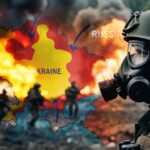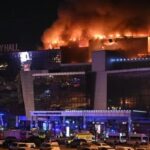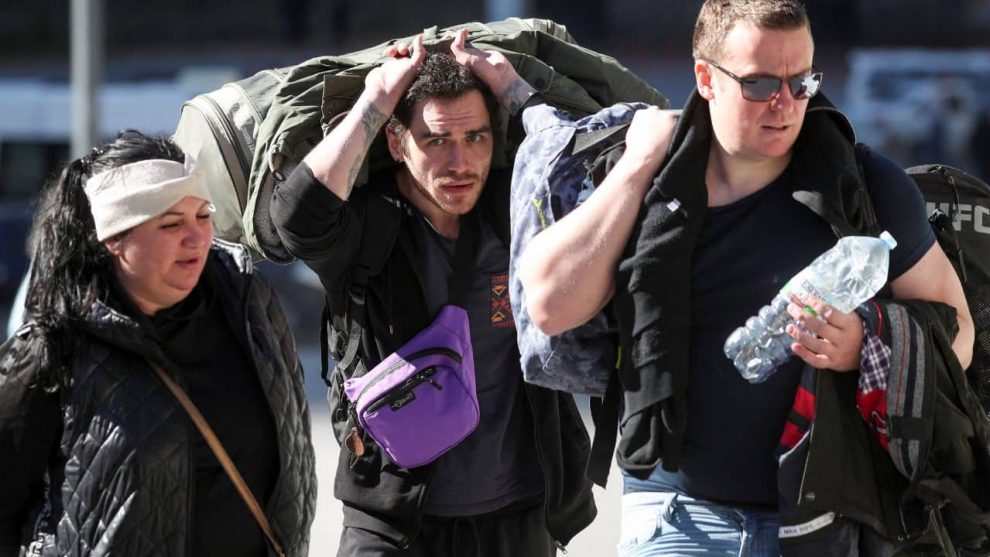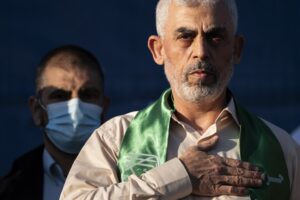The Big Story: Referendums at Gunpoint in Ukraine, Recruitment Centers on Fire in Russia
What happened: Demonstrations and resistance amid the chaotic start of partial war mobilization in Russia – the first since World War II – continued over the weekend across the country and in occupied territories in Ukraine. A Siberian recruitment officer was shot at a recruitment office early today, and at least 20 enlistment offices have been set on fire across Russia since President Vladimir Putin’s surprise announcement on Wednesday summoning 300,000 reservists, according to news outlets cited by The Moscow Times.
More context: Russia is considering prohibiting draft-age men from leaving the country. Resistance seems particularly heavy in the Dagestan republic; scenes of local residents confronting recruiters and chanting “no to war” have filled social media, with police firing warning shots at a protest yesterday where 100 people were arrested, Reuters reports. In the Russian-annexed Crimea region in Ukraine, 80% of conscription notices have been issued to the Crimean Tatar minority group, according to the organization Crimea SOS, The New York Times reports. The group’s founder, Alim Aliev, urged people not to cooperate with the summons, adding “It’s a war crime, which may lead to genocide of the Crimean Tatar people.”
Worth noting: Today marks the fourth day of Moscow’s referendums, illegal under international law according to NPR, purporting to allow occupied areas of Ukraine to vote on joining the Russian Federation, Reuters reports. Groups of armed men, accompanying people with portable ballot boxes, are going door-to-door in the occupied areas to demand that residents vote to join Russia, The Washington Post reports. Along with the referendums and the war mobilization, a drone strike on the port city of Odessa today increased fears that Moscow plans to further escalate the war, AP reports. The Odessa attack came hours after Washington, in response to Putin’s latest nuclear saber-rattling last week, promised retaliation and “catastrophic” consequences if Russia uses nuclear weapons in Ukraine.
News from the Regions
Central Europe and the Baltics
- Pink Floyd co-founder Roger Waters canceled two planned concerts in Krakow after an uproar over his views on the war in Ukraine, AP reports. The controversy broke out after Polish media reports of an open letter by Waters to Ukraine’s first lady, Olena Zelenska, in which the aging musician blamed “extreme nationalists” in Ukraine for setting “your country on the path to this disastrous war.”
- The head of the Bank of Latvia says the possible economic recession facing the country will not be as bad as the crisis of 2008, BNN reports, citing LTV. During the global financial crisis in 2008-2009, Latvian GDP shrunk by almost 25% and the unemployment rate climbed over 21%, according to UN statistics.
Southeastern Europe
- A parliamentary candidate in Bulgaria cannot do any in-person campaigning because he is on the battlefield in Ukraine, RFE/RL reports. Ivan Kalchev of the Green Movement party joined the Ukrainian foreign legion in March.
- Serbia and Russia signed an agreement on foreign policy consultations during the UN General Assembly over the weekend, Euractiv reports. The move further jeopardizes Serbia’s chances at EU membership, the European Parliament’s Serbia Rapporteur said.
Eastern Europe and Russia
- An analysis by Forum 18 found that violations of freedom of religion in the Moscow-controlled Ukrainian territory of Crimea include imprisonment for belief, the closing down of places of worship, and fines against people for organizing religious meetings without Russian state permission.
Central Asia
- Uzbekistan has suspended the Russian payment system Mir, with banks in Kazakhstan and Turkey following suit, following Washington’s recent expansion of sanctions to include any financial institution that allows the payment cards, according to reports from The Moscow Times and Reuters. Turkey’s President Recep Tayyip Erdogan criticized the U.S. Treasury’s direct warnings to Turkish businesses about allowing the payment cards, which are popular with Russian travelers.
- A mass exodus of Russians to Kazakhstan – the largest since the first wave at the start of the war on Ukraine – followed Putin’s announcement last week of a partial mobilization, Eurasianet reports.
Source : Tolownews















